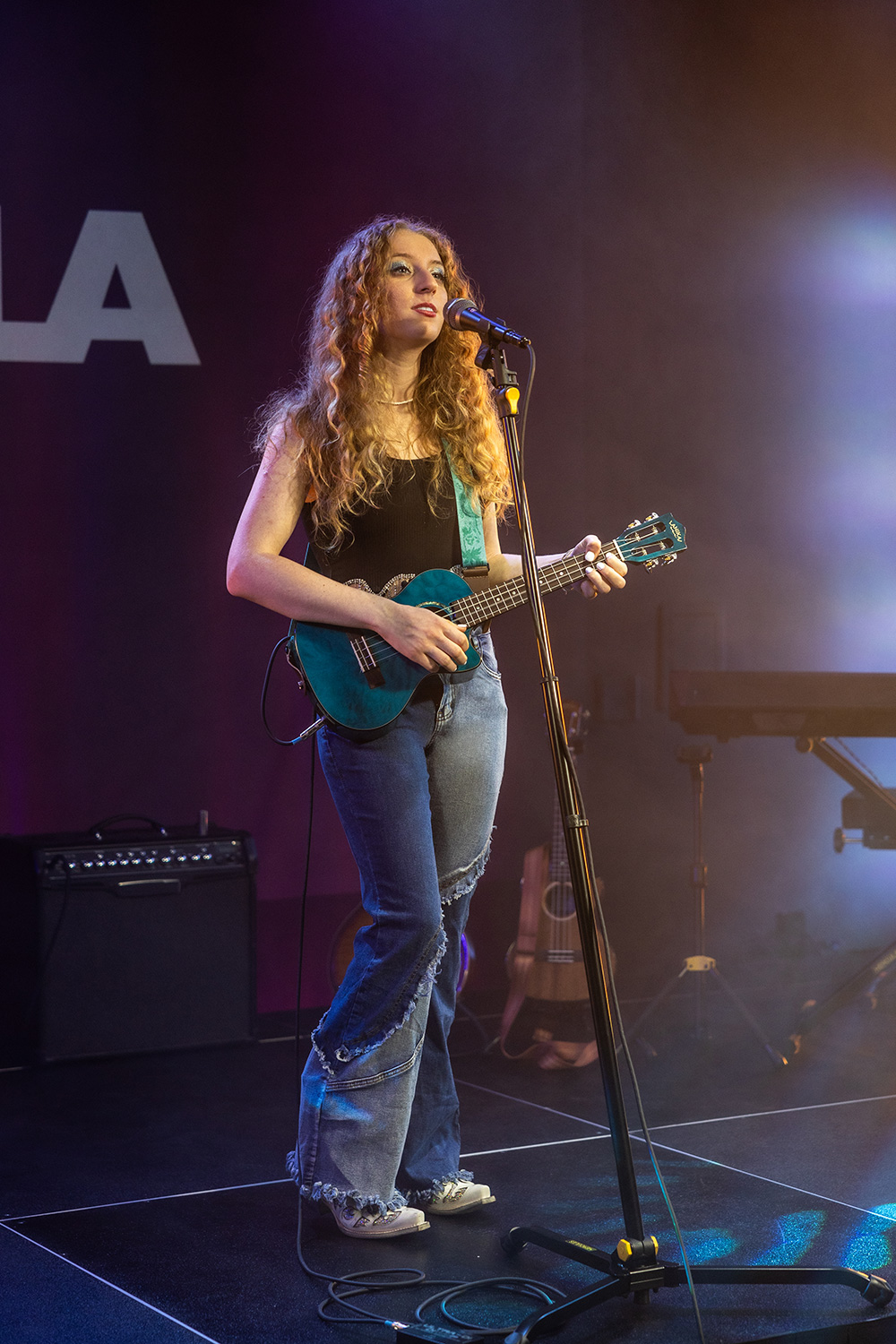Lanikai Pricing
Lanikai uses premium woods, specialized build methods, many design features and brand name components to create beautiful, dependable and player friendly ukuleles that provide excellent tone and performance for players of all levels and musical styles.
Lanikai features 10 advantages on their ukuleles, designed to enhance your playing experience:
- Open back tuning keys
- Hidden scarf joint
- Nubone XB nut/saddle
- Wide, comfortable neck profile
- Strap buttons
- Triple matched wood on top, back, and sides
- 8-hole quick tie bridge
- Gig bag or foam case included with all ukuleles
- Premium branded components
There are a few factors that you should consider when purchasing a ukulele, including the size, wood, construction, type of case, and whether the ukulele includes electronics. Lanikai offers several wood grain options in either a laminate, Solid Top, or All Solid construction in Glossy or Satin Finish. To Learn More about Lanikai’s full line, scroll down to the Find Your Ukulele tool on the bottom of this page.
| Wood | Price Range | Construction | Sizes | Acoustic Models? | Electric Models? |
|---|---|---|---|---|---|
| Acacia All Solid | $540-$1050 | All Solid | Concert, Tenor | Y | Y |
| Acacia Solid Top | $300-$880 | Solid Top | Soprano, Concert, Tenor, Baritone, Guitelele, Multi-String | Y | Y |
| Cedar Solid Top | $240-$600 | Solid Top | Soprano, Concert, Tenor | Y | Y |
| Figured Bocote | $600-$820 | Laminate | Bass | N | Y |
| Flame Maple | $240-$675 | Laminate | Concert, Tenor, Baritone, Multi-String | Y | Y |
| Julia Michaels Signature (Maple) | $350-$640 | Painted Laminate | Tenor | Y | Y |
| LU Series (Okoume) | $110-$220 | Laminate | Soprano, Concert, Tenor, Baritone | Y | N |
| Mahogany | $140-$750 | Laminate | Soprano, Concert, Tenor, Baritone, Bass, Pineapple, Guitelele, Multi-String | Y | Y |
| All Solid Mahogany | $340-$800 | All Solid | Concert, Tenor, Baritone | Y | Y |
| All Solid Morado | $630-$940 | All Solid | Concert, Tenor | N | Y |
| Oak | $180-$810 | Laminate | Soprano, Concert, Tenor, Baritone, Bass | Y | Y |
| Quilted Maple | $500-$845 | Laminate in 5 Different Finishes | Concert, Tenor, Baritone, Guitelele | N | Y |
| Spruce Solid Top | $260-$930 | Solid Top | Soprano, Concert, Tenor, Baritone, Bass | Y | Y (Bass Only) |
Pricing FAQs
What are the differences between Laminate, Solid Top and All Solid Ukuleles?
- LAMINATED: Laminated wood ukuleles are the most popular type of ukulele. They have a pleasing sound, are available across a range of prices and offer durability. The wood of a laminated ukulele is in several layers with crisscrossed grains. There is a decorative veneer layer on top to finish it off. The laminated wood ukulele is very durable and resilient to splitting or cracking. However, like any string instrument, temperature and climate extremes should be avoided.
- SOLID TOP: On a Solid Top ukulele, the top wood is solid or one piece of wood, but it is book-matched, meaning it is split down the middle and opened like a book, which results in grain patterns that mirror one another from one side of the top to the other. The back and sides of a solid top ukulele are laminated or layered wood. The solid top naturally gives the ukulele a more rounded tone and more projection or volume. Solid wood is more susceptible to temperature extremes and humidity changes, so it requires a little extra care. In dry climates, a humidifier is suggested to keep the top wood in good condition and not too dry. To avoid splits or cracks in a solid top ukulele, keep it in a comfortable controlled climate with adequate humidity (between 40% and 60%).
- ALL SOLID: An all solid ukulele means the top, back and sides are all made of solid wood pieces. However, the top, back and sides typically utilize book-matched wood, meaning it is split down the middle and opened like a book. Usually on the top and back you can see the mirrored grain patterns on the left and right. In addition, Lanikai bookmatches the ukulele’s sides, too. All solid wood ukuleles tend to cost more, but feature a well-developed tone and good projection, making them preferred by many players. While they have an excellent acoustic tone, all solid ukuleles are the most delicate and susceptible to temperature extremes and humidity changes. In dry climates or during dry winter seasons use a humidifier to keep the wood in good condition. It is important that all solid ukuleles are properly stored to avoid potential problems. To avoid splits and cracks in an all solid ukulele, store in a comfortable, controlled climate that is properly humidified (between 40% and 60%).
Should I purchase an acoustic or acoustic/electric model?
Our variety of acoustic models deliver a warm to bright tone with full projection. However, for those wanting to record or perform, our pickup models offer an active output with EQ and volume controls for easy ¼” output to amplifiers, DI boxes or mixers. On electric models, the battery is activated when the cable is plugged in or if the tuner is activated. To prolong battery life, disconnect the cable from the ukulele when not in use and make sure if equipped with a tuner, that it is in the off position. With normal use, the battery should last around a year, slightly less if use is increased.
What hidden costs should I expect with a new ukulele?
For all wooden instruments, it is important to avoid extreme conditions when it comes to humidity, especially for Solid Top or All Solid ukuleles. Humidifiers are available that attach in the sound hole of the instrument or in a compartment in the case to ensure your instrument is protected from cracks.
You will also need to change the strings of your ukulele periodically. We recommend D’Addario and Aquilia strings with our instruments. Most Lanikai models utilize the D’Addario EJ88 series strings, and for our bass ukuleles we suggest the D’Addario EXPPBB190GS strings. For our LU series, we use Aquila strings and our Guiteleles use the 96c set.
To keep your instrument safe, we also recommend keeping your ukulele in a case or displayed on a stand or wall hanger, such as the Hercules Stands Ukulele Collection. All Lanikai ukuleles come with a case or gig bag. Wall hangers and stands will generally cost between $15-$50. Lanikai also sells hardshell cases for additional protection that will generally cost between $160-$190.
Lanikai also includes two strap buttons on all ukuleles. Straps are available in a variety of sizes and materials, but will generally cost between $10-$30, although some premium straps with genuine leather or extra padding will cost more.
A truss rod on ukuleles (included on Lanikai’s Baritones, Guiteleles and Basses) is a metal rod in the neck of the ukulele that adjusts the tension that strings put on the neck. Occasionally this will need to be adjusted, usually due to temperature/humidity changes. It is best to bring your ukulele to a store to make these adjustments and will typically cost you $20-$50.
If you have purchased an acoustic/electric ukulele, you may need to occasionally replace the battery. Both the Fishman® Kula Active 3 band EQ preamp and tuner (used in Lanikai’s Concert, Tenor, Baritone, and Guitelele ukuleles) and the Fishman® Clásica II pickup (used in Lanikai’s Bass ukuleles) uses a 9-volt battery.
Do Lanikai Ukuleles come with a case?
Yes, all Lanikai ukuleles come with either a gig bag or foam case. Lanikai also offers hardshell cases at an additional cost for musicians looking for additional protection for their ukuleles while traveling.
Why do Lanikai prices vary so much?
Prices depend on what type of wood is used, the size and construction of the ukulele, as well as additional features, such as acoustic vs electric and type of hardware.
Why are some ukuleles less and some more expensive than Lanikai?
Lanikai sits in the mid-tier of the ukulele market. It offers a wide range—from affordable laminate models to solid-wood instruments with acoustic-electric options—making it accessible to both beginners and intermediate players. While not boutique, Lanikai emphasizes playability, aesthetics, and features like wider nuts and onboard electronics, easily exceeding the quality of entry-level brands. However, it does not command the artisanal craftsmanship of some handcrafted builders, which keeps Lanikai pricing moderate but with multiple player friendly features.
Is there a warranty with Lanikai Ukuleles?
In the United States, Lanikai covers all of it’s instruments with a Limited Lifetime Warranty. This warranty covers manufacturing issues that might occur. No warranty registration is needed, but you will need to keep your receipt as proof of purchase if you need to submit a warranty claim.
Customers who purchased products outside the USA should contact their local distributor for the handling and resolution of all warranty issues. The KHS America Warranty is not applicable.
Does a Lanikai hold it’s value for resale or trade-in?
Resale value will depend heavily on the original model and the condition (dings, scratches or other damage). The All Solid and Solid top ukuleles as well as clean, well-maintained ukuleles will have the best chance of a good return.
Is a Lanikai really worth the investment?
A Lanikai ukulele is a smart investment for players seeking quality, style, and value. With features like wider nuts, solid wood options, and dependable electronics, they offer impressive playability and tone. Lanikai provides a broad selection tailored to both beginners and seasoned musicians, making it easy to find a model that fits your needs. It’s a brand that meets players where they are, with instruments that inspire growth and musical enjoyment. Lanikai resale used value is consistent with their mid-level quality if they are maintained and well cared for.
Find Your Ukulele
Find your perfect ukulele with our interactive ukulele selection tool. Choose your preferred size, wood type, and features to discover the ideal model for your needs.
Step 1 of 1: Size

